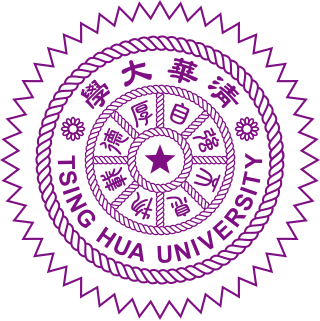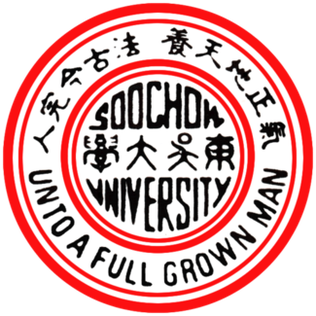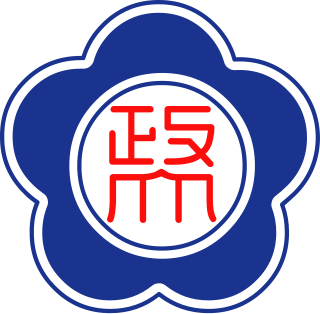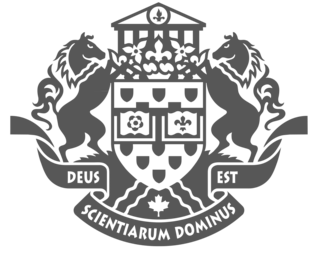
National Tsing Hua University (NTHU) is a public research university in Hsinchu, Taiwan. It was first founded in Beijing. After the Chinese Civil War, president Mei Yiqi and other academics fled with the retreating Nationalist government to Taiwan, where they founded National Tsing Hua University in 1956. The university remains independent and distinct from Tsinghua University in Beijing.

Legal education is the education of individuals in the principles, practices, and theory of law. It may be undertaken for several reasons, including to provide the knowledge and skills necessary for admission to legal practice in a particular jurisdiction, to provide a greater breadth of knowledge to those working in other professions such as politics or business, to provide current lawyers with advanced training or greater specialisation, or to update lawyers on recent developments in the law.
The original Soochow University was a university based in Suzhou and Shanghai in China, established in 1900. The university was registered in the state of Tennessee in the United States.
A Master of Laws is an advanced postgraduate academic degree, pursued by those either holding an undergraduate academic law degree, a professional law degree, or an undergraduate degree in a related subject. In most jurisdictions, the LL.M. is the advanced professional degree for those usually already admitted into legal practice.

Soochow University is a private university in Taipei, Taiwan. Soochow University maintains a church and a Methodist minister in residence, though it may be considered a secular institution. The university is noted for studies in comparative law and accounting.

Zhongzheng District is a district in Taipei, Taiwan. Taipei Main Station is located in the district. It is home to most of the national government buildings of Taiwan.

National Chengchi University is a public research university in Taipei, Taiwan. The university is also considered as the earliest public service training facility of Taiwan. First established in Nanjing in 1927, the university was subsequently relocated to Taipei and resumed full operation in 1954 as the first re-established "National University" in Taiwan.

National Taipei University, founded in 1949, is a national university in Taiwan. Before 2000, the university was named the College of Law and Business, National Chung Hsing University. The university's main campus is in Sanxia District, New Taipei; its two other campuses are in Zhongshan District, Taipei, Taiwan.
The educational system in Taiwan is the responsibility of the Ministry of Education. The system produces pupils with some of the highest test scores in the world, especially in mathematics and science.

National Chiao Tung University (NCTU) was a public research university in Hsinchu, Taiwan. Established in 1896 as Nanyang Public School by an imperial edict of the Guangxu Emperor, it was one of China's leading universities. After the Chinese Civil War, NCTU was re-established by former Chiao Tung University faculty and alumni in Taiwan in 1958.

A law school is an institution, professional school, or department of a college or university specializing in legal education, usually involved as part of a process for becoming a judge, lawyer, or other legal professional within a given jurisdiction. Depending on the country, legal system, or desired qualifications, the coursework is undertaken at undergraduate, graduate, or both levels.

The Supreme Court of the Republic of China is the court of last resort in Taiwan, except matters regarding interpretation of the Constitution and unifying the interpretation of laws and orders which are decided by the Constitutional Court of the Judicial Yuan.

The University of Ottawa Faculty of Law is the law school at the University of Ottawa, located in Ottawa, Ontario, Canada. Established in 1953, the faculty is today divided into Civil Law and Common Law sections, the two formally recognized legal traditions in Canada.
Law enforcement in Taiwan operates primarily through governmental police agencies.
The law of the Republic of China as applied in Taiwan, Penghu, Kinmen, and Matsu is based on civil law with its origins in the modern Japanese and German legal systems. The main body of laws are codified into the Six Codes:
The legal system of Ukraine is based on civil law, and belongs to the Romano-Germanic legal tradition. The main source of legal information is codified law. Customary law and case law are not as common, though case law is often used in support of the written law, as in many other legal systems. Historically, the Ukrainian legal system is primarily influenced by the French civil code, Roman Law, and traditional Ukrainian customary law. The new civil law books were heavily influenced by the German Bürgerliches Gesetzbuch.

Soochow University is a provincial public university in Suzhou, Jiangsu, China. It is affiliated with the Province of Jiangsu, and co-funded by the SASTIND and the provincial government. The university is part of Project 211 and the Double First-Class Construction.

Konkuk University Law School is one of the professional graduate schools of Konkuk University, formerly known as the College of Law. Located in Seoul, Republic of Korea, it is one of the 25 government approved law schools. It has the lowest student to faculty ratio in the country. It plans to specialize in real estates law and offers scholarship to all students. 50% of the students will receive half scholarship and the other 50% of the students will get full scholarship.
Soochow University School of Law is one of the oldest law schools in Taiwan. It is part of Soochow University. It enjoyed the high reputation of "Chaoyang in the North, Soo Chow in the South" amongst Chinese law schools. It is dedicated to legal professional education, National law and Anglo-American law. This is the first comparative law school in Asia, and actively cultivates comparative law and the international law professionals.

Tung Pao-cheng or Dung Bau-tscheng is a Taiwanese legal scholar and politician who was the Taiwanese minister of Examination from 2012 to 2015.












